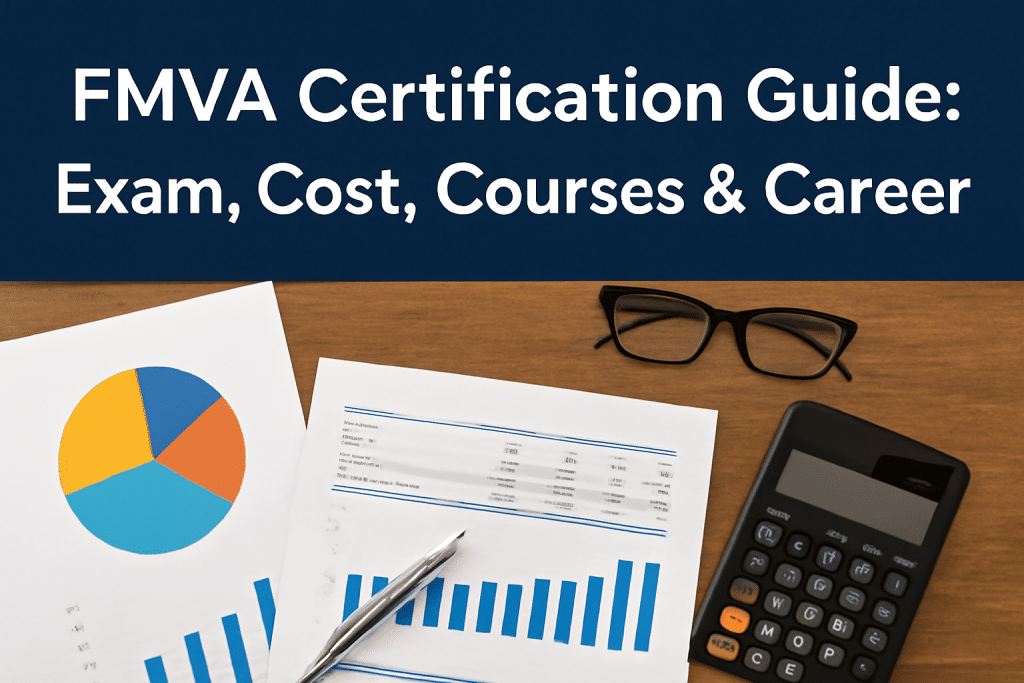If you are serious about building a career in finance, the FMVA certification is one of the most practical and career-defining credentials you can earn. Whether you are an aspiring financial analyst, a recent finance graduate, or a working professional looking to sharpen your technical skills, this guide covers everything you need to know about the FMVA certification in 2026.
From exam structure and costs to study tips and career outcomes, this is the most comprehensive FMVA guide you will find online.
What is the FMVA Certification?
The Financial Modeling and Valuation Analyst (FMVA) certification is offered by the Corporate Finance Institute (CFI). It is one of the most respected and widely recognized credentials in the world of corporate finance, investment banking, and private equity.
Unlike theoretical finance certifications, the FMVA focuses on practical, hands-on skills that employers actually look for. You learn to build financial models in Excel, value companies using real methods, analyze financial statements, and present data-driven insights with confidence.
The program is entirely online and self-paced, making it accessible for both students and working professionals around the world.
Who Should Pursue the FMVA?
The FMVA certification is ideal for:
- Finance graduates entering the job market
- Financial analysts looking to advance their careers
- Accountants transitioning into corporate finance roles
- Investment banking and private equity aspirants
- Business professionals who work with financial data
- Anyone looking to develop strong Excel and modeling skills
FMVA Certification Requirements and Eligibility
One of the biggest advantages of the FMVA certification is that there are no strict prerequisites. You do not need a specific degree or prior certification to enroll.
However, to get the most out of the program, it helps to have:
- A basic understanding of financial statements (income statement, balance sheet, cash flow statement)
- Familiarity with Excel fundamentals
- General awareness of finance and accounting concepts
If you are completely new to finance, CFI also offers beginner-level courses that can help you build a foundation before starting the FMVA program.
FMVA Exam Structure and Format
The FMVA exam is designed to test both your theoretical knowledge and practical ability to apply financial modeling and valuation concepts.
Exam Overview
| Detail | Information |
| Number of Questions | 50 multiple-choice questions + case studies |
| Exam Duration | Approximately 4 hours |
| Passing Score | 70% |
| Format | Online, open-book |
| Attempts | Multiple attempts allowed |
What the Exam Tests
The exam covers a combination of multiple-choice questions, written case studies, and practical Excel-based modeling tasks. You will be expected to:
- Build and interpret dynamic financial models
- Apply valuation techniques like DCF and comparable company analysis
- Analyze financial statements and calculate key ratios
- Work through realistic business scenarios under time pressure
The open-book format does not mean the exam is easy. It requires a deep understanding of concepts and the ability to apply them quickly and accurately.
FMVA Exam Domain Breakdown
Understanding how marks are distributed across topics helps you prioritize your study time.
| Domain | Weightage |
| Financial Modeling | 25% |
| Finance | 25% |
| Excel | 17% |
| Valuation | 10% |
| Budgeting and Forecasting | 8% |
| Presentation and Visuals | 8% |
| Accounting | 5% |
| Strategy | 4% |
Financial Modeling and Finance together make up 50% of the exam. This should be the core focus of your preparation. Excel skills come in third at 17%, highlighting that technical proficiency in spreadsheet work is equally critical.
Sample Exam Question
To give you an idea of what to expect, here is a sample DCF-style question:
A company has revenue of $5 million in the most recent year. Revenue is expected to grow at 5% annually for the next 5 years. The discount rate is 10% and the terminal growth rate is 3%. Calculate the enterprise value of the company.
This type of question requires you to know how to project cash flows, apply a discount rate, calculate terminal value, and arrive at a final enterprise value figure.
FMVA Certification Cost in 2026
The FMVA certification is available through two subscription packages. Your choice depends on your learning style, timeline, and how much support you need.
Package 1: Self-Study — $497
This package is best for individuals who are already comfortable with finance fundamentals and prefer learning at their own pace.
What is included:
- All core courses
- Access to elective courses
- Practice exams
- Final certification exam
- Lifetime access to course materials
Package 2: Full Immersion — $847
This package is designed for professionals who want a more structured and supported learning experience.
What is included:
- Everything in the Self-Study package
- Excel crash course
- Financial Modeling Bootcamp
- Personalized feedback on financial models
- One-on-one coaching sessions
- Course-integrated AI chatbot support
- Premium customer support
Package Comparison
| Feature | Self-Study ($497) | Full Immersion ($847) |
| Core Courses | Yes | Yes |
| Elective Courses | Yes | Yes |
| Practice Exams | Yes | Yes |
| Certification Exam | Yes | Yes |
| Lifetime Access | Yes | Yes |
| Excel Crash Course | No | Yes |
| Financial Modeling Bootcamp | No | Yes |
| Personalized Model Feedback | No | Yes |
| One-on-One Coaching | No | Yes |
| AI Chatbot Support | No | Yes |
| Support Level | Basic | Premium |
Which Package Should You Choose?
If you have prior finance experience and are confident in your Excel skills, the Self-Study package at $497 offers excellent value. If you are newer to the field or want structured accountability and feedback, the Full Immersion package at $847 is worth the additional investment given the personalized support it provides.
How to Earn the FMVA Certification: Step-by-Step
Step 1: Enroll in the Program
Go to the Corporate Finance Institute website and choose your preferred subscription package. Once enrolled, you immediately get access to all course materials and can start learning at any time.
Step 2: Complete the Core Courses
Core courses form the foundation of the FMVA program. They must be completed before you sit the final exam. Here is a breakdown of the essential core courses:
| Core Course | Duration | What You Learn |
| Financial Analysis Fundamentals | 5 hours | Profitability ratios, leverage ratios, trend analysis |
| Introduction to 3-Statement Modeling | 6 hours | Building an integrated income statement, balance sheet, and cash flow model |
| Business Valuation | 6 hours | DCF analysis, comparable company analysis, valuation methods |
| Financial Modeling and Analysis | 10 hours | Operational models, sensitivity analysis, advanced DCF modeling |
Total core course time is approximately 27 hours. Most candidates complete core courses within 4 to 8 weeks depending on their schedule.
Step 3: Choose Your Elective Courses
After completing core courses, you can select electives that align with your career goals. You need to complete at least three elective courses to qualify for the final exam.
| Elective Course | Duration | Best For |
| Mergers and Acquisitions (M&A) Modeling | 8 hours | Investment banking, deal advisory |
| Leveraged Buyout (LBO) Modeling | 15 hours | Private equity, leveraged finance |
| Private Equity and Venture Capital | 6.5 hours | PE firms, VC analysts |
| Real Estate Financial Modeling | Variable | Real estate finance |
| Budget vs. Actual Analysis | Variable | FP&A roles, corporate finance |
Electives allow you to specialize your knowledge and make the certification more directly applicable to your target industry or role.
Step 4: Prepare for the Final Exam
Once your courses are complete, dedicate focused time to exam preparation. The key areas to concentrate on include:
- Rebuilding financial models from memory without looking at course materials
- Practicing DCF valuations with different assumptions and scenarios
- Reviewing Excel shortcuts and efficiency techniques
- Working through case studies that replicate real exam questions
- Taking full-length practice exams under timed conditions
Practice exams are one of the most valuable tools available during this phase. They help you get familiar with question types, identify knowledge gaps, and build the time management skills needed on exam day.
For additional practice questions and exam preparation resources, visit CertEmpire.com, where you can find study materials designed to help you prepare effectively for finance certifications including the FMVA.
Step 5: Take the FMVA Exam
When you feel confident in your preparation and are consistently scoring well on practice tests, schedule and sit the final exam. The exam is taken online and consists of multiple-choice questions, case studies, and Excel modeling tasks across approximately 4 hours.
You need a score of 70% or higher to pass.
Step 6: Receive Your Certification
Once you pass, your digital FMVA certificate is issued and sent via email. You can add it to your LinkedIn profile, resume, and professional portfolio. For Full Immersion subscribers, you also receive personalized feedback on models you built during the program.
FMVA vs CFA vs CPA: Which Certification is Right for You?
Many finance professionals wonder how the FMVA compares to other well-known certifications. Here is a clear, honest comparison.
| Certification | Duration | Cost | Core Focus | Best For |
| FMVA | 2–12 months | $497–$847 | Financial Modeling, Valuation | Corporate finance, IB, PE |
| CFA | 3–4 years | $1,000–$4,000 per level | Investment Theory, Asset Management | Portfolio management, equity research |
| CPA | 1–2 years | $500–$3,000 | Accounting, Taxation | Public accounting, auditing |
The FMVA is the most practical and fastest to complete among the three. It is not a replacement for the CFA or CPA but serves a different purpose. If your goal is to build financial models, work in investment banking or private equity, or move into a corporate finance role, the FMVA is the most directly relevant credential.
Career Opportunities After FMVA Certification
Earning the FMVA certification positions you for a wide range of high-value roles across the finance industry.
Common Job Roles for FMVA Holders
Financial Analyst Analyze company financials, build models, and provide investment insights. Entry point for most corporate finance careers.
Investment Banking Analyst Work on mergers, acquisitions, and capital market transactions. FMVA skills are directly applicable to day-to-day IB work.
Private Equity Analyst Evaluate investment targets, build LBO models, and track portfolio company performance.
Corporate Finance Manager Oversee financial planning, forecasting, and budgeting for a company. Senior role requires strong modeling and analytical skills.
FP&A Analyst (Financial Planning and Analysis) Manage budgets, forecasts, and variance analysis to support business decision-making.
Equity Research Analyst Write research reports and financial models to support buy or sell recommendations on publicly traded companies.
FMVA Salary Expectations in 2026
The FMVA certification can significantly improve your earning potential, particularly in specialized finance roles.
| Role | Average Salary Range (USD) |
| Financial Analyst | $60,000 – $80,000 |
| FP&A Analyst | $61,000 – $81,000 |
| Equity Research Analyst | $74,000 – $109,000 |
| Private Equity Analyst | $85,000 – $130,000 |
| Investment Banking Analyst | $99,000 – $167,000 |
| Corporate Finance Manager | $105,000 – $170,000 |
These salary ranges reflect the strong demand for professionals who can build accurate financial models and perform credible valuations. Roles like investment banking and private equity analyst sit at the higher end because of the technical complexity and deal exposure involved.
Key Benefits of the FMVA Certification
Practical, Job-Ready Skills
The FMVA is built around what employers actually need. You leave the program knowing how to build three-statement models, run DCF analyses, and present financial data clearly. These are not theoretical skills but tools you can use from day one on the job.
Flexible, Self-Paced Learning
The entire program is online. There are no fixed class schedules, no commuting, and no deadlines unless you set them yourself. You can complete the program in as little as two months or spread it over a year depending on your availability.
Globally Recognized Credential
The FMVA is recognized by employers in North America, Europe, Asia, and beyond. It carries real weight on a resume because it demonstrates both knowledge and the discipline to complete a rigorous program.
Strong Return on Investment
At $497 to $847, the FMVA is significantly more affordable than other finance certifications. When you compare that cost against potential salary increases in roles like investment banking or private equity, the return on investment is clear.
Access to a Professional Network
Completing the FMVA connects you with a global community of CFI alumni working across top financial institutions, consulting firms, and corporations. This network can be valuable for job referrals, mentorship, and career guidance.
FMVA Exam Preparation Tips
1. Build Models From Scratch Do not rely on templates. Practice building financial models from a blank spreadsheet. This forces you to understand every component and prepares you for the practical sections of the exam.
2. Take Practice Exams Seriously Use practice exams not just as a test of what you know, but as a diagnostic tool to identify gaps. Review every incorrect answer and understand why it was wrong before moving on.
3. Master Excel Shortcuts Speed and accuracy in Excel matter. Learn keyboard shortcuts for formatting, navigation, and formula entry. The exam is timed, and working efficiently in Excel will save you valuable minutes.
4. Study the High-Weightage Domains First Financial Modeling (25%) and Finance (25%) make up half the exam. Make sure these areas are solid before spending significant time on lower-weightage domains like Strategy (4%) or Accounting (5%).
5. Apply Concepts to Real Companies Take a publicly listed company and try to build a simple DCF model using their actual financial statements. This real-world practice is far more effective than studying slides alone.
6. Manage Your Time on Exam Day With 4 hours for the full exam, you have enough time if you stay focused. Do not spend more than 3-4 minutes on any single multiple-choice question. Flag difficult questions and come back to them.
| Preparation Tip | Why It Matters |
| Build models from scratch | Develops true understanding, not just pattern recognition |
| Take timed practice exams | Builds exam stamina and time management skills |
| Review all incorrect answers | Identifies and closes knowledge gaps |
| Focus on high-weightage domains | Maximizes points gained per hour of study |
| Practice Excel shortcuts | Improves speed during practical tasks |
| Use real company financials | Connects concepts to actual business scenarios |
Is the FMVA Certification Worth It in 2026?
For most finance professionals, the answer is yes.
The FMVA is affordable, practical, globally recognized, and directly tied to skills that employers in corporate finance, investment banking, and private equity actively look for. It is not a replacement for experience, but it is an excellent way to build a credible skills foundation or signal to employers that you are serious about your development.
If you are entering the finance job market, the FMVA gives you a technical edge over candidates without modeling skills. If you are already working in finance, it helps you formalize and deepen skills you may have only partially developed on the job.
The certification is worth pursuing if you want to work in any of the following areas: investment banking, private equity, corporate finance, FP&A, equity research, or financial consulting.
Frequently Asked Questions
What is the FMVA certification exam like?
The exam consists of multiple-choice questions, case studies, and practical Excel modeling tasks. It is open-book, lasts approximately 4 hours, and requires a passing score of 70%.
How long does it take to complete the FMVA certification?
Most candidates complete the program in 2 to 12 months. If you study consistently for 1-2 hours per day, you can realistically finish in 2 to 3 months.
Do I need a finance degree to enroll?
No. There are no educational prerequisites. A basic understanding of financial statements and Excel is helpful but not required.
How much does the FMVA certification cost?
The Self-Study package costs $497 and the Full Immersion package costs $847. Both include lifetime access to course materials and the final exam.
What career opportunities are available after earning the FMVA?
Common roles include Financial Analyst, Investment Banking Analyst, Private Equity Analyst, FP&A Analyst, Corporate Finance Manager, and Equity Research Analyst.
What skills do I need to pass the FMVA exam?
You need a solid understanding of financial modeling, DCF and comparable company valuation, three-statement financial modeling, Excel proficiency, and financial statement analysis.
How does the FMVA compare to the CFA?
The FMVA focuses on practical financial modeling and valuation skills and can be completed in months. The CFA is a broader, more theoretical credential that takes 3-4 years and is better suited for portfolio management and investment research careers.
Conclusion
The FMVA certification is one of the most practical and career-relevant credentials available in finance today. It focuses on the exact skills that employers in investment banking, private equity, and corporate finance demand, and it does so through a curriculum built around real-world application rather than theory alone.
In 2026, the demand for finance professionals who can build models, value businesses, and analyze financial data is only growing. Earning the FMVA positions you to meet that demand with confidence and credibility.
Whether you are just starting your finance career or looking to take it to the next level, the FMVA certification provides a clear, practical, and affordable path forward.
For exam preparation resources and practice questions to help you prepare for the FMVA and other finance certifications, visit CertEmpire.com.


























